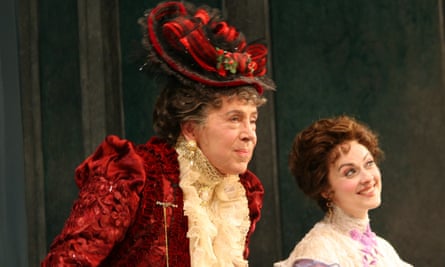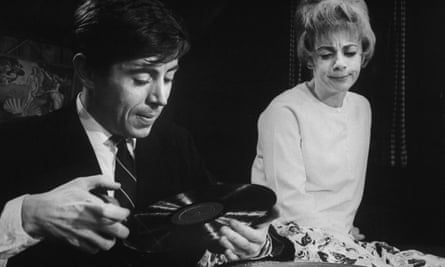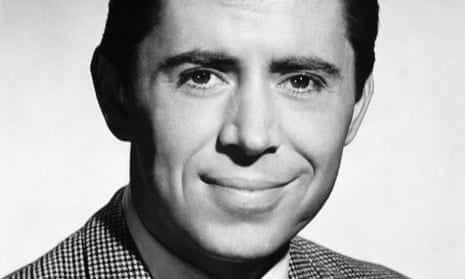Brian Bedford, who has died aged 80, was, said the New York Times in 2011, “the finest English-language interpreter of classical comedy of his generation” – a reputation forged over 50 years, mostly on Broadway and also at the Stratford Ontario Festival theatre in Canada, where he more or less settled. On neither side of the Atlantic has anyone played more of the leading Shakespearean roles than Bedford. But he also specialised in high comedy, and Molière. He last appeared on Broadway, in 2011, as an acclaimed Lady Bracknell in The Importance of Being Earnest.
As a shining star in the West End of London in the late 1950s and early 60s, Bedford decided to escape a gilded social and theatrical milieu in which he felt uneasy, for America. He first went to New York in 1959, in John Gielgud’s production of Peter Shaffer’s Five Finger Exercise, which was welcomed by Kenneth Tynan as “the most accomplished new play in a wretched season”.
Bedford played, said Tynan, a young man whose “love for his mother [played by Jessica Tandy] goes far beyond the normal bounds of filial duty,”, and executed a role full of sarcasm and complaint without once sneering. Bedford had played the role in the West End, shortly after playing Ariel – in silver hair and wispy green veils – to Gielgud’s Prospero in The Tempest, directed by Peter Brook, at Stratford-upon-Avon. That production transferred to Drury Lane in London.

By 1967 Bedford had fully decamped to New York and, from 1975, when he played Malvolio and Angelo in Measure for Measure at the Stratford festival, he relocated almost permanently to a cottage in Ontario that he renovated and shared with his partner, the actor Tim MacDonald.
Bedford was born of Irish Catholic extraction in Morley, West Yorkshire, to Arthur Bedford, a postman, and his wife, Ellen (nee O’Donnell). The family home had an outside lavatory and no running hot water. Two of Brian’s three older brothers died of tuberculosis, and Arthur took his own life.
Brian was educated at St Bede’s school in Bradford. He left aged 15 to train as a warehouseman, then joined the Bradford Civic theatre as an amateur and befriended Brian Epstein, the future manager of the Beatles, who was also in the company. He won a place at Rada (1952-54) in London, where his classmates included Peter O’Toole, Albert Finney, who directed him in Noël Coward’s Private Lives, and Alan Bates, a lifelong friend.
Bedford played Hamlet, aged 21, at the Liverpool Playhouse before making a London debut at the Arts theatre as Travis de Coppet in The Young and the Beautiful, based on a story of Scott Fitzgerald. This brought him to the attention of the leading West End producer Binkie Beaumont and his partner, John Perry, who virtually adopted him, becoming, Bedford said, “the parents I always wanted”.
Before joining Gielgud in Stratford, he played the Sicilian immigrant Rodolpho in Brook’s British premiere of Arthur Miller’s A View from the Bridge, performed at the Comedy theatre (now the Harold Pinter) in 1956 under club conditions; the Lord Chamberlain refused a licence. Rodolpho is described by the play’s hero, whose daughter he loves, as “walking wavy”. This sexual ambiguity was at the heart of the controversy.

Other London appearances before Bedford left for good were in Frederick Knott’s Write Me a Murder (1962) at the Lyric, a murder thriller with violent plot twists; as the tubercular, romantic artist Louis Dubedat in an all-star Haymarket revival of Shaw’s The Doctor’s Dilemma in 1963; and as Tom in Ann Jellicoe’s The Knack at the New theatre (now the Noël Coward) in 1964.
On Broadway, he cemented his standing after Five Finger Exercise as an elegant, murderous gang leader in Pauline Macaulay’s The Astrakhan Coat (1967) and as Edward Chamberlayne in TS Eliot’s The Cocktail Party at the Lyceum in 1968. Also in 1968, he was the effete bridegroom of Estelle Parsons’s fading burlesque star in Tennessee Williams’s The Seven Descents of Myrtle, a big flop that registered, according to the critic Brooks Atkinson, “a collapse of talent”. He soon recovered: I saw him in a superb Broadway revival of Private Lives in 1969.
Bedford won a 1971 Tony award on Broadway as the riotously despicable Arnolphe in Molière’s mordantly moralistic The School for Wives (in which he grooms his own ward as his putative wife and lover) and then starred in two British modern classics: on a US tour in the title role of Simon Gray’s Butley (1973), then on Broadway as the philosopher George Moore in Tom Stoppard’s Jumpers (1974), a performance admired as much for its meticulous articulation as its amnesiac buffoonery.
This ushered in his “golden age” at Stratford Ontario (1975-80) which coincided with the artistic directorship of Robin Phillips and the participation of Maggie Smith. Opposite Smith, who renewed her career in this period, he played Richard III, Jaques in As You Like It and, once more, Elyot in Private Lives (“a brilliant black diamond of a performance”, said one critic). When he played Benedick to Smith’s second Beatrice (the first was with Robert Stephens at the National) in 1980, Michael Billington thought “they sparked off each other like Spencer Tracy and Katharine Hepburn.”
Other roles over the years at Stratford included Brutus, Macbeth, Shylock and Leontes. And as he developed solo touring shows based on Shakespeare and Oscar Wilde, Bedford diversified into television – he popped up in Cheers, Frasier and Murder, She Wrote – and in movies. His best known film credits include Grand Prix (1966), the voice of a distinctly foxy Robin Hood in the 1973 Disney film and the FBI executive Clyde Tolson in Oliver Stone’s Nixon (1995) with Anthony Hopkins.
But he was really a stage animal, perhaps one of the last “old school” flamboyant actors whom most of the modern theatre – Beckett and Pinter, for sure – had passed by. He continued to surprise and delight his audiences, as King Lear – which he performed, in his own production – in 2007 at Stratford Ontario, as a “heart-breaking” 1994 Timon of Athens and as a definitive Orgon in Molière’s Tartuffe on Broadway in 2003.
He and Tim, partners since 1986, were married in 2013. Tim survives him.

Comments (…)
Sign in or create your Guardian account to join the discussion